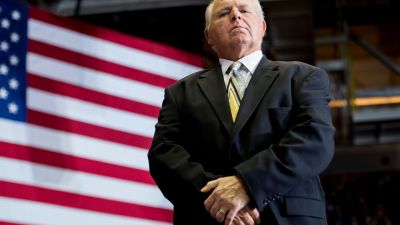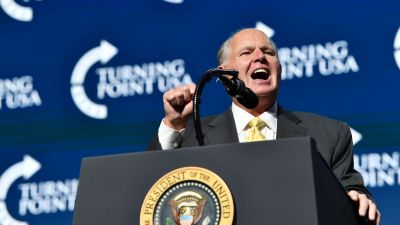
Former Secretary of State and Democratic presidential hopeful Hillary Clinton testifies before the House Select Committee on Benghazi on Capitol Hill October 22, 2015. The committee's final report, issued June 28, 2016, found no evidence of wrongdoing by her. (Photo by Saul Loeb/AFP/Getty Images)
In a world of bad actors, how does any particular outrage, any pinprick of suspicion that there’s malfeasance in high places, get branded into the collective psyche? How does the breath of scandal crystallize into a household swearword?
Reader, if I asked you for an eight-letter word beginning with B and ending with i, you probably wouldn’t have to think long before you’d snap your fingers and burst out: Benghazi! Even outside our borders, you might well produce the same answer. On vacation in Belize a few months ago, I saw a pickup truck adorned with a bumper sticker which said something about Hillary Clinton, Benghazi and a lot of blood that was on her hands.
How does a hitherto obscure name, a speck of a reference flowing down the vast torrent of everyday information, become a household word? Repetition that dovetails with an emotional charge. Repetition and charge. Repetition and charge. The name, the term, the place hooks into emotion. When media repeat the name, they trigger the emotion along with a whole complex of images and thoughts that accompany it. Drummed home repeatedly, the name of a Libyan city becomes common currency. It stands for a whole complex of feelings and beliefs, a worldview. A synapse takes form in millions of minds:
Benghazi-Hillary-incompetence-or-worse-dereliction-of-duty-betrayal-maybe-treason. Benghazi swells into a whole clump of accusations, a ready-made chyron term, a headline staple. The killings of Ambassador Christopher Stevens and his three colleagues get jammed into a Republican talking point.
As amply reported this week, after a two-year, $7 million investigation, the House Select Committee on Benghazi released its 800-page report, in which it brought forth no evidence to tar Secretary Clinton. In the words of The New York Times’ Eric Schmitt, “The Republican-led committee found no evidence of culpability or wrongdoing by Hillary Clinton, then the secretary of state.” That much was widely reported. But it was not so widely reported that Dr. Anne Stevens, the sister of the murdered ambassador and the family spokeswoman, told The New Yorker’s Robin Wright that she herself does not fault Hillary Clinton. The congressional report itself made news, but Dr. Stevens’ remarks were more straightforward and considerably briefer:
It is clear, in hindsight, that the facility was not sufficiently protected by the State Department and the Defense Department. But what was the underlying cause? Perhaps if Congress had provided a budget to increase security for all missions around the world, then some of the requests for more security in Libya would have been granted. Certainly the State Department is underbudgeted.
I do not blame Hillary Clinton or Leon Panetta. They were balancing security efforts at embassies and missions around the world. And their staffs were doing their best to provide what they could with the resources they had. The Benghazi Mission was understaffed. We know that now. But, again, Chris knew that. It wasn’t a secret to him. He decided to take the risk to go there. It is not something they did to him. It is something he took on himself.
CNN online picked up The New Yorker story, but so far as I can determine, none of the television networks did.
Meanwhile, we’re well into the third decade of Clinton memes, stuck like burrs to the herd mind — at least the herd mind of a certain age. Whitewater, cattle futures, Gennifer Flowers… and the unforgettable Monica Lewinsky, each episode encapsulating what historian Sean Wilentz memorably called a pseudo scandal — a speck of personal, financial and sexual life metastasized into a mountain.
But we have to understand that pseudoscandals don’t invent themselves. They aren’t found lying around on the street. Institutions churn them out. Usually they start with a smidgen of fact, though sometimes no fact at all is required: take Obama-Kenya-Muslim-birth-certificate. Political enemies launch the campaign and it gets traction when they succeed in attaching themselves to a political institution: a congressional committee, a leaky grand jury, a special prosecutor. Thus did the Benghazi story — “Benghazi,” when condensed for rapid consumption into a single word — “happen” when media piggybacked on Republican-dominated institutions and campaigns. Garry Wills astutely points out how this clump of Trumpian accusations serves multiple purposes.
The media do not conjure a pseudoscandal from absolutely nothing, but from a speck they seed a pearl. After all, to dredge up a scandal from scratch is labor-intensive work. Making contact with whistleblowers, and vice versa, is hard.
To sort a good story from the fakes and frauds takes time, persistence and presence of mind. Investigative reporters are scarce under the best of circumstances, which are scarcely what our afflicted democracy faces now that newsrooms have been hit by neutron bombs of cost-cutting.
I’ve been writing regularly for BillMoyers.com about Donald Trump’s on-and-off reported relations with mobsters. Mostly I’ve channeled the work of master investigative reporters Wayne Barrett and David Cay Johnston. The articles appear on adventuresome websites but they haven’t gone big and they haven’t gone national. In the media mind, which tends to morph into the public mind, the Trump-mob synapse hasn’t formed.
Neither have a number of other scandalous Trump doings reached household status. I won’t itemize them here: David Cay Johnston did it months ago in The National Memo. They concern not only mob connections but special tax abatements and other tax mysteries, nonunion labor in a union town, cutting corners to get casino licenses and philanthropic shortfalls, i.e., broken promises and lies.
On this subject, it’s a pleasure to note that, this week, The Washington Post’s David A. Farenthold has plunged deep into the possibly bottomless swamp of Trumpesquerie in a piece headlined: “Trump promised millions to charity. We found less than $10,000 over 7 years.” It was Farenthold who discovered that Trump hadn’t delivered on the charitable promises he’d made to veterans. In his subsequent piece, Farenthold began:
In May, under pressure from the news media, Donald Trump made good on a pledge he made four months earlier: He gave $1 million to a nonprofit group helping veterans’ families.
Before that, however, when was the last time that Trump had given any of his own money to a charity?
If Trump stands by his promises, such donations should be occurring all the time. In the 15 years prior to the veterans donation, Trump promised to donate earnings from a wide variety of his moneymaking enterprises: The Apprentice. Trump Vodka. Trump University. A book. Another book. If he had honored all those pledges, Trump’s gifts to charity would have topped $8.5 million.
But in the 15 years prior to the veterans’ gift, public records show that Trump donated about $2.8 million through a foundation set up to give his money away — less than a third of the pledged amount — and nothing since 2009. Records show Trump has given nothing to his foundation since 2008.
All credit to the Post. And more: just a couple of days after this article, Farenthold struck again. Should this material get picked up more widely, the synapses would flow: Trump-cheapskate; Trump-braggart-who-doesn’t-deliver; you can play this game yourself. At this writing, the story of the — shall we say, Trump philanthropic default — has not broken out.
What stops a story from breaking out, let alone going Yuge? It’s sometimes a matter of overload and sometimes a matter of journalists getting bored. It’s virtually an occupational requirement in the profession that you start with a diminished attention span.
Editors get bored too. The news cycle spins. (The very currency of the term “news cycle” in recent years suggests how fast the vehicle rolls.) Local newspaper competition isn’t what it used to be, but still, the papers feel pressure to keep up, to move on to the next newsworthy item. At the TV networks a reporter comes upon a news notion. One ready response from superiors: Didn’t we already do that? This is where the institutional pressure counts. If a credible source outside the newsroom keeps knocking on the door with a reminder to pay attention, the story is much more likely to “break out.”
Old-timers in news used to say that each report in a continuing story must “advance the story.” Once a story is, in some form, already “out there,” reporters from other news organizations are not supposed to cut and paste what’s already been published. They are supposed to move it, enlarge it, deepen it with new facts, new sources, new angles.
Opportunities abound. The swamp of Donald Trump’s life and times has only barely been probed.




